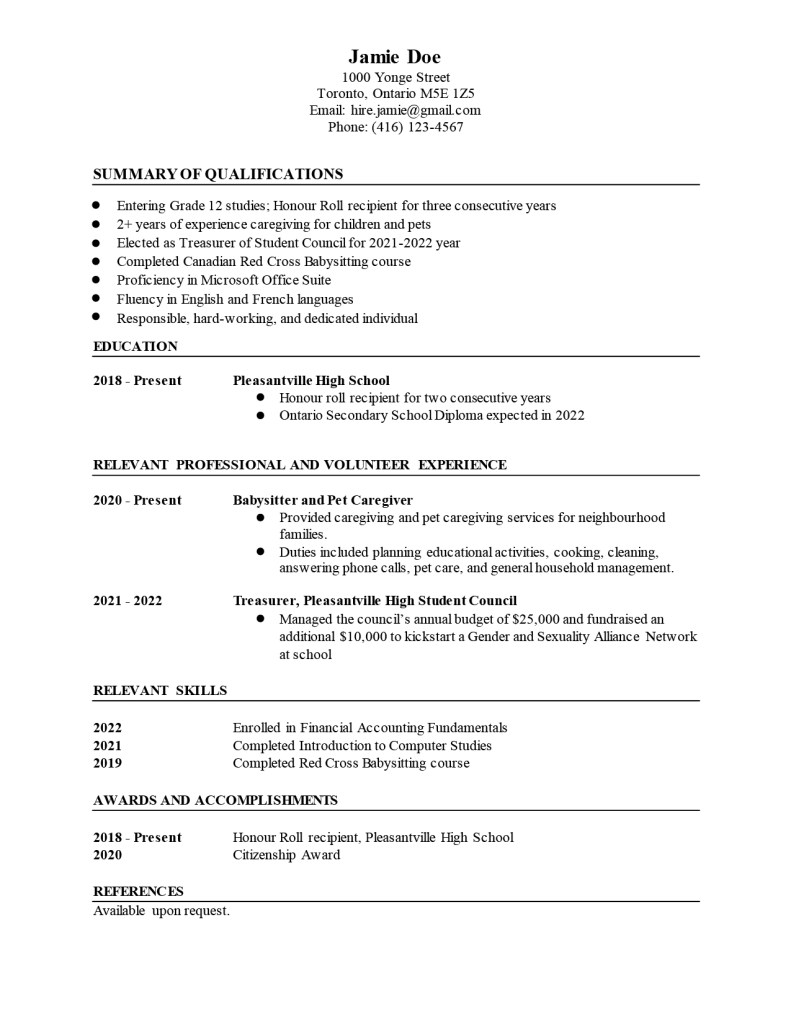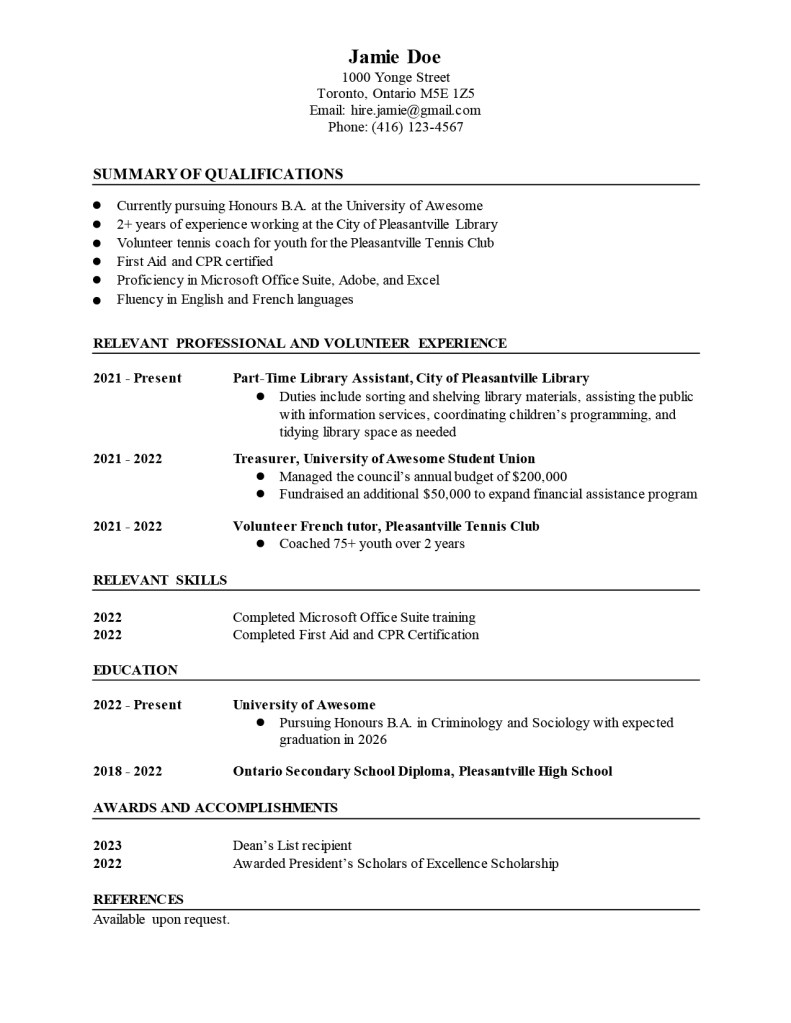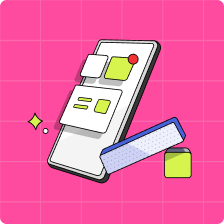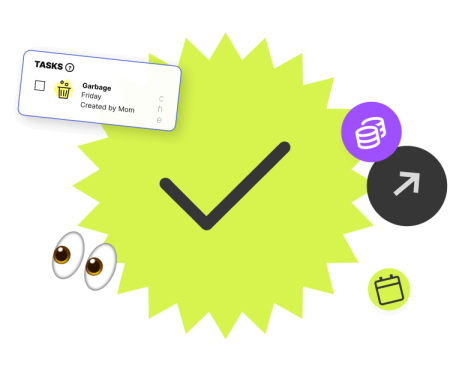You’ve scoured the job postings, picked the best of the bunch, and now it’s “game on” for getting hired. But before hitting “apply,” the first step is to learn how to make a resume for teens. It’s an ultra-important document that makes the first impression on your employer, and it’s your ticket for putting your best foot forward.
From advice about what to include (or exclude!) to writing a resume with no work experience to resume examples for teens, we’ve got the scoop on how to write a resume.
View our favourite Resume Examples for Teens.
What is a resume?
A resume is a formal written document that outlines your qualifications, such as your education, skills, work experience, and any notable accomplishments.
“The purpose of a resume is to showcase your skills and experience and to convince a prospective employer that it is worth calling you in for a job interview,” says Sabrina McTaggart, a career coach for young adults based in Ottawa, Ontario.
Most employers require a resume to apply for a job and it’s typically two pages maximum. It’s often accompanied by a cover letter—a one-page letter of introduction that summarizes why you’re applying for the job and what makes you an ideal candidate.
Learn more about Best Summer Jobs for Teens in Canada
What should be on a resume for a teenager?
A resume is your chance to shine to a prospective employer. But avoid listing all things you’ve ever accomplished in your life. Here’s what should make the cut:
1. Your contact information
Your contact information should be front and centre. Specifically, the heading at the top of the first page should contain your name, address, email address, website, LinkedIn URL, and phone number.
Tip: Now is the time to create a professional email address. MrSlamDunk5001@gmail.com is appropriate for corresponding with your peeps, but not with hiring managers. It doesn’t have to be complicated: you can use your name (Jamie.Doe@gmail.com) or create a generic address (hire.jamie@gmail.com).
2. Summary/objective
Consider this section to be the “Coles Notes” version of your entire resume. Write a bullet-point listicle that rounds up the reasons why you’re the prime candidate for the job: from your educational achievements to your mad computer skills to awards and accolades. For example:
- Entering fourth year of secondary school studies at Pleasantville High School.
- Five years of experience caregiving for children.
- Proficiency in Word, Adobe, and Excel software.
- First Aid and CPR Certified.
- Strong attention to detail, superior organizational and project management skills.
- Familiar with social media.
- Hold a valid Ontario driver’s licence.

3. Relevant experience
This section should be a snapshot of past and present experiences that demonstrate your ability to do the job.
You should include:
- Job or position title
- Name of employer or organization
- Dates of employment or participation
- A summary of responsibilities and accomplishments (written as a bullet point list is acceptable).
“Briefly outline your relevant work experience and volunteer experience and what skills you developed in that work,” says McTaggart. “You can add any relevant extracurriculars that might make you a more attractive candidate, such as athletic accomplishments or music competitions.”
It’s standard to list your experiences in reverse chronological order (e.g., start with the most recent and work backwards) and only include what’s relevant and recent. A laundry list of everything you’ve ever done is TMI. Instead, highlight unique or noteworthy experiences that demonstrate your ability to handle the job.
Tip: Show, don’t tell. You may have been elected to the student council (e.g., “Student Council Treasurer 2022-2023”), but it’s more impressive to share what you accomplished in that position (e.g., “Managed the council’s annual budget of $25,000 and fundraised an additional $10,000 to kickstart a Gender and Sexuality Alliance Network at school”).
Learn more: 14 best part-time jobs for teens.
What to put on a resume with no experience
’If you’ve never had a job, think outside the box. Did you house sit for your neighbour? Do you coach your younger sibling’s soccer team? Did you volunteer for a beach clean-up last summer? A hiring manager is looking to see examples of when you’ve acted responsibly, which could translate to on-the-job cred.
“Employers are aware that teens often have little formal work experience when they are hiring for student jobs and entry-level positions,” says McTaggart. “Consider how you might demonstrate that you have some useful skills, such as organizing, planning, writing, communication, and a strong work ethic.” She suggests including skills you learned while doing chores for neighbours and relatives, babysitting, dog-walking, or tutoring peers in school.
4. Education
List any past, current, and future educational achievements in reverse chronological order (most recent first and work backwards). This should be the shortest section on your resume and include:
- The name of your school(s)
- Any diploma/degree in progress or attained
- Major/field of study
- Enrollment dates
- Expected graduation date
- GPA (if above 3.5)
- Any notable awards
If you’ve just graduated, list your high school, and if applicable, any post-secondary institution that you will attend next year.
If you’re still a student with limited job experience, you can put this section at the top of your resume. But if you’ve graduated and have ample work experience under your belt, your education is slightly less important and can be parked near the bottom.
Tip: “Include details about your education, including any awards such as Honour Roll or Dean’s List,” says McTaggart. Just keep it short and simple: “Graduated third in a class of 200 students, with a GPA of 3.8.”

5. Relevant skills
Showcase personal and professional skills that are relevant to the position and give concrete examples. For instance, if you’re applying to a summer camp, spelling out that you’re “First Aid and CPR certified” may give you a leg up over other candidates. If driving is an essential part of the job, mention that you have a valid driver’s licence (as well as list the licence class and how long you’ve held it).
This is also the place to park any computer skills; fluency in languages; and certifications, licences, or professional courses that you’ve completed (or are currently completing).
“Are you proficient with any software?” asks McTaggart. “Be sure to note, for example, if you can use document, spreadsheet or presentation software, and especially if you have any experience coding at any level.”
Possible skills could include:
- Customer service
- French language
- Organized
- Creative
- Research
- First aid
- Basic coding
- Video editing
- Photography
- Social media
- Communication skills
- Microsoft Office
- Leadership
- Fundraising
- Valid drivers licence
To understand what skills to include, study the job description. Does the position require using a computer? Are you handling cash? Will you be communicating with customers? Read between the lines and pick out the most important competencies for the job.
“For example, if you volunteered to help seniors with their technology in a retirement home, you have demonstrated strong communication skills, patience, and reliability,” says McTaggart.
Tip: Resist the urge to embellish your skills. Hiring managers often do background checks to confirm details. They may even request a copy of your purported credentials.
Read more: Job interview questions for teens with sample answers.
6. Awards and achievements
This is your chance to humblebrag about your awesomeness! List any scholarships, bursaries, awards, or achievements. These could be through school, the community, or extracurricular activities. If you’re applying for your first job, these seemingly small achievements can help your resume sparkle above the rest.
7. References (optional)
While not mandatory, you can list up to three professional contacts who can speak to your character and/or professional experience. Always ask before listing a potential reference on your resume. No one likes surprises, and a courtesy “heads up” gives the person time to think about what to say.
Learn more about How to prepare for your first job interview.

Tips for writing a resume for teens
- Stick to one to two pages: If you exceed that length, you risk overloading the hiring manager with information. Less is more!
- Make a professional email address: “Avoid things like hunnybunny@hotmail,” says McTaggart.
- Make your resume visually appealing: “This does not mean getting fancy,” says McTaggart. “It simply means making good use of white space and avoiding dense blocks of text.” Also, be consistent with fonts and formatting.
- Keep it simple: A resume should be eye-catching but not gaudy. “Unless you are applying for a role where a lot of creativity is required, it is advisable to avoid flashy colours and fonts,” says McTaggart. “The key to a good resume is to make it readable and professional.”
- Think about what the employer wants: Then, customize your resume to fit those qualifications. “Put yourself in the shoes of your prospective employer: they want a teen who is reliable, punctual, has a good attitude, can follow instructions and communicate clearly,” says McTaggart.
- Study the job posting: It gives clues about what the employer wants in a job candidate, as well as keywords to include in your resume. It might also give intel on possible interview questions.
- Prove you’re a leader: “Leadership skills are highly regarded by employers,” says McTaggart. “If you have ever been captain of a team, coached the younger members of your basketball club or taken a leadership role in your school play, be sure to highlight this.
- Use “action” words to paint a picture. Use descriptive language to leverage your skills and experience, as well as what you’ve achieved. Instead of simply saying you “did a thing,” consider if you could use these verbs such as led, researched, created, managed, delivered, resolved, founded, developed, tracked, collaborated, grew, or promoted. The thesaurus is your BFF!
- Proofread: Your resume should be squeaky-clean before you hit send. Run a spelling and grammar check—ideally, twice. Read the resume out loud to catch any awkward sentences or to trim length. Get a friend or family member to proofread for typos too.
- Ready your references: “If you have done good work for someone, even if informally like babysitting or snow shovelling, consider asking them for a letter of reference,” says McTaggart. “You can then list these folks under your ‘References’ section.” She also recommends making the request in person and routinely after you finish a job. While few people do this, it’s a good habit that can pay off later.
- Minimize your digital footprint: Hiring managers typically do online searches for job candidates. If you’ve got a digital presence that you’d rather not share with a potential boss, switch your social media settings to private.
Tip: Include a cover letter with your resume. Learn more about how to write a cover letter for students.

Resume Examples for Teens
Need some help crafting your perfect resume? We’ve got you! Here are some resume template for teens that can help:
Resume with no work experience for teens
A sample resume for a high school student with no job experience:

Resume with work experience for teens
A sample resume for a first-year university student with job experience:

Last word about how to make a resume for teens
If you’ve made it this far, you should be well-equipped to take on the task of creating a resume. Start by studying the job description and brainstorming what skills and experiences might be highly valued by the hiring manager. Using these pro tips, draft a resume that showcases your skills and uses concrete examples that are directly relevant to the position. Remember to have a friend or family member proofread it before you hit send.
One last piece of advice: avoid the pressure to be perfect. At this age and stage, no one expects you to have a jam-packed resume with fancy awards and job experience. Avoid “padding” your resume with complicated or overblown achievements.
“As a teen, you’re not applying for Senior Vice President roles!” says McTaggart. “Keep it simple.”
Download the Mydoh app to help your tweens and teens gain real-life experience managing their money.
This article offers general information only and is not intended as legal, financial or other professional advice. A professional advisor should be consulted regarding your specific situation. While the information presented is believed to be factual and current, its accuracy is not guaranteed and it should not be regarded as a complete analysis of the subjects discussed. All expressions of opinion reflect the judgment of the author(s) as of the date of publication and are subject to change. No endorsement of any third parties or their advice, opinions, information, products or services is expressly given or implied by Royal Bank of Canada or its affiliates.








